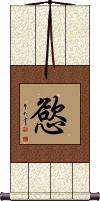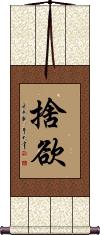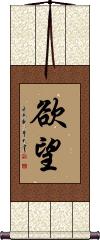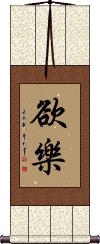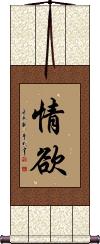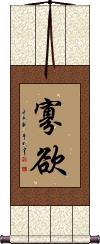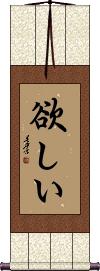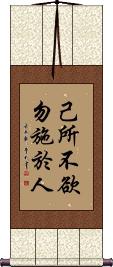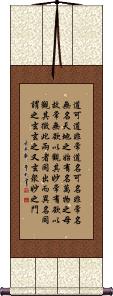Many custom options...
And formats...

欲 in Chinese / Japanese...
Buy an 欲 calligraphy wall scroll here!
Personalize your custom “欲” project by clicking the button next to your favorite “欲” title below...
Desire / Longing / Craving
慾 means desire, longing, appetite, wish, covetousness, greed, passion, desire, avarice, and craving.
慾 is universal in Chinese, Japanese Kanji, and Korean Hanja.
The context in which this character is used determines whether the meaning is good or bad. As a single character on a wall scroll, you get to decide what the definition is to you (hopefully more toward desire than greed).
![]() Please note that Japanese use a simplified version of this character - it also happens to be the same simplification used in mainland China. Click on the character to the right if you want the Japanese/Simplified version of desire.
Please note that Japanese use a simplified version of this character - it also happens to be the same simplification used in mainland China. Click on the character to the right if you want the Japanese/Simplified version of desire.
Give Up Desire
Desire / Craving
欲望 is a word that means strong desire, while some might translate it as “lust.”
The first character of this word means desire, longing, hunger, covetousness, greed, passion, desire, craving, or wish. The second character means to hope for, ambition, desire, aspire, expect, gaze (into the distance), or look for something.
Kama - Desire Wish Longing
欲樂 is the Chinese and Japanese title representing the Buddhist and Jainist joys of the five desires.
Kama comes from the Pali/Sanskrit काम. The meaning is “desire, wish, longing.”
In Jainism, it can include sensual pleasure, sexual desire, and longing.
However, the Buddhist context refers more to any desire, wish, passion, longing, the pleasure of the senses, desire for, longing to and after, the aesthetic enjoyment of life, affection, or love, enjoyment of love is particularly with or without the enjoyment of sexual, sensual and erotic desire, and is often used without sexual connotations.
Lust / Desire / Passion
情欲 can be defined as lust, sexual desire, sensual desire, carnal desire, carnal passions, sexual desire, and passion.
The first character means feeling, emotions, passionate, sympathy, affection, love, compassion, tender feelings, and sometimes circumstances or facts.
The second character means desire, longing, appetite, wish, covetousness, greed, passion, desire, and craving.
This word is universal in Chinese, Japanese Kanji, and Korean Hanja.
Release of Desires
I Want You
Some people like to say, “I love you,” but if you want to say “I want you,” here it is in Japanese... 欲しい
This can be read as “I want you” or as a single word, “wanted,” “wished for,” “in need of,” or “desired.”
Note: Because this selection contains some special Japanese Hiragana characters, it should be written by a Japanese calligrapher.
Confucius: Golden Rule / Ethic of Reciprocity
Do not do to others what you do not want done to yourself
Some may think of this as a “Christian trait,” but actually, it transcends many religions.
This Chinese teaching dates back to about 2,500 years ago in China. Confucius had always taught the belief in being benevolent (ren), but this idea was hard to grasp for some of his students, as benevolence could be kind-heartedness or an essence of humanity itself.
When answering Zhong Gong's question as to what "ren" actually meant, Confucius said:
己所不欲勿施于人 or "When you go out, you should behave as if you were in the presence of a distinguished guest; when people do favors for you, act as if a great sacrifice was made for you. Whatever you wouldn't like done to you, do not do that thing to others. Don't complain at work or home.”
Hearing this, Zhong Gong said humbly, “Although I am not clever, I will do what you say.”
From this encounter, the Chinese version of the “Golden Rule” or “Ethic of Reciprocity” came to be.
The characters you see above express, “Do not do to others whatever you do not want to be done to yourself.”
Daodejing / Tao Te Ching - Chapter 1
This text is the first chapter of the Daodejing / Tao Te Ching.
The text reads:
道可道、非常道。名可名、非常名。 無名天地之始 有名萬物之母。故常無欲以觀其妙、常有欲以觀其徼。此兩者同出而異名。同謂之玄。玄之又玄、衆妙之門。
This classical Chinese passage comes from the Mawangdui (馬王堆帛書) text.
The Way that can be followed is not the eternal Way.
The name that can be named is not the eternal name.
The nameless is the origin of heaven and earth
While naming is the origin of a myriad of things.
Therefore, always desireless, you see the mystery
Ever desiring, you see the manifestations.
These two are the same—
When they appear they are named differently.
This sameness is the mystery,
Mystery within mystery;
The door to all marvels.
Dr. Muller's translation of all 81 Daodejing chapters
Not the results for 欲 that you were looking for?
Below are some entries from our dictionary that may match your 欲 search...
| Characters If shown, 2nd row is Simp. Chinese |
Pronunciation Romanization |
Simple Dictionary Definition |
慾 欲 see styles |
yù yu4 yü yoku よく |
More info & calligraphy: Desire / Longing / Cravinggreed; craving; desire; avarice; wants Passion, inordinate desire, lust, v. 欲. |
欲 see styles |
yù yu4 yü yoku よく |
More info & calligraphy: Desire / Longing / Cravinggreed; craving; desire; avarice; wants; (surname) Yoku rājas, passion. Also kāma, desire, love. The Chinese word means to breathe after, aspire to, desire, and is also used as 慾 for lust, passion; it is inter alia intp. as 染愛塵 tainted with the dust (or dirt) of love, or lust. The three desires are for beauty, demeanour, and softness; the five are those of the five physical senses. |
寡欲 see styles |
guǎ yù gua3 yu4 kua yü keyoku かよく |
More info & calligraphy: Release of Desiresreduction of desires |
情欲 see styles |
qíng yù qing2 yu4 ch`ing yü ching yü jōyoku じょうよく |
More info & calligraphy: Lust / Desire / PassionThe passions, desires. |
捨欲 舍欲 see styles |
shě yù she3 yu4 she yü shayoku |
More info & calligraphy: Give Up Desire |
欲望 see styles |
yù wàng yu4 wang4 yü wang yokumō よくぼう |
More info & calligraphy: Desire / Cravingdesire |
欲樂 欲乐 see styles |
yù lè yu4 le4 yü le yokuraku |
More info & calligraphy: Kama - Desire Wish Longing |
欲しい see styles |
hoshii / hoshi ほしい |
More info & calligraphy: I Want You |
己所不欲勿施於人 see styles |
onorenohossezarutokorohitonihodokosukotonakare おのれのほっせざるところひとにほどこすことなかれ |
More info & calligraphy: Confucius: Golden Rule / Ethic of Reciprocity |
三欲 see styles |
sān yù san1 yu4 san yü sanyoku |
three lusts, i. e. for 形貌 form, 姿態 carriage or beauty, and 細觸refinement, or softness to the touch. |
不欲 see styles |
bù yù bu4 yu4 pu yü fuyoku |
does not want |
五欲 see styles |
wǔ yù wu3 yu4 wu yü goyoku |
The five desires, arising from the objects of the five senses, things seen, heard, smelt, tasted, or touched. Also, the five desires of wealth, sex, foodand-drink, fame, and sleep. |
人欲 see styles |
jinyoku じんよく |
human desires; human passions |
伊欲 see styles |
iyoku いよく |
(surname) Iyoku |
六欲 see styles |
liù yù liu4 yu4 liu yü rokuyoku |
The six sexual attractions arising from color; form; carriage; voice (or speech); softness (or smoothness); and features. |
利慾 利欲 see styles |
lì yù li4 yu4 li yü |
cupidity See: 利欲 |
利欲 see styles |
riyoku りよく |
greed; avarice |
制欲 see styles |
seiyoku / seyoku せいよく |
(noun/participle) control of passions; control of appetite |
受欲 see styles |
shòu yù shou4 yu4 shou yü juyoku |
to indulge in desires |
名欲 see styles |
míng yù ming2 yu4 ming yü myōyoku |
attachment to fame |
味欲 see styles |
wèi yù wei4 yu4 wei yü miyoku |
味著 The taste-desire, hankering after the pleasures of food, etc.; the bond of such desire. |
嗜慾 嗜欲 see styles |
shì yù shi4 yu4 shih yü |
lust |
四欲 see styles |
sì yù si4 yu4 ssu yü shiyoku |
The four desires or passions: 情 sexual love; 色 sexual beauty or attractiveness; 食 food; 婬 lust. |
塵欲 尘欲 see styles |
chén yù chen2 yu4 ch`en yü chen yü jinyoku |
The desires connected with the six guṇas. |
大欲 see styles |
daiyoku だいよく taiyoku たいよく |
avarice |
如欲 see styles |
rú yù ru2 yu4 ju yü nyoyoku |
according to one's wishes |
婬欲 淫欲 see styles |
yín yù yin2 yu4 yin yü inyoku |
Sexual desire. |
將欲 将欲 see styles |
jiāng yù jiang1 yu4 chiang yü sōyoku |
am going to... |
小欲 see styles |
shouyoku / shoyoku しょうよく |
(being) slightly covetous; a little covetousness |
少欲 see styles |
shǎo yù shao3 yu4 shao yü shōyoku しょうよく |
(being) slightly covetous; a little covetousness few desires |
Click here for more 欲 results from our dictionary
The following table may be helpful for those studying Chinese or Japanese...
| Title | Characters | Romaji (Romanized Japanese) | Various forms of Romanized Chinese | |
| Desire Longing Craving | 慾 欲 | yoku | yù / yu4 / yu | yü |
| Give Up Desire | 捨欲 舍欲 | shayoku | shě yù / she3 yu4 / she yu / sheyu | she yü / sheyü |
| Desire Craving | 欲望 | yokubou / yokubo | yù wàng / yu4 wang4 / yu wang / yuwang | yü wang / yüwang |
| Kama - Desire Wish Longing | 欲樂 欲乐 | yokuraku | yù lè / yu4 le4 / yu le / yule | yü le / yüle |
| Lust Desire Passion | 情欲 | jouyoku / joyoku | qíng yù / qing2 yu4 / qing yu / qingyu | ch`ing yü / chingyü / ching yü |
| Release of Desires | 寡欲 | keyoku | guǎ yù / gua3 yu4 / gua yu / guayu | kua yü / kuayü |
| I Want You | 欲しい | hoshii / hoshi | ||
| Confucius: Golden Rule Ethic of Reciprocity | 己所不欲勿施於人 己所不欲勿施于人 | jǐ suǒ bú yù wù shī yú rén ji3 suo3 bu2 yu4, wu4 shi1 yu2 ren2 ji suo bu yu, wu shi yu ren jisuobuyu,wushiyuren | chi so pu yü, wu shih yü jen chisopuyü,wushihyüjen |
|
| Daodejing Tao Te Ching - Chapter 1 | 道可道非常道名可名非常名無名天地之始有名萬物之母故常無欲以觀其妙常有欲以觀其徼此兩者同出而異名同謂之玄玄之又玄衆妙之門 道可道非常道名可名非常名无名天地之始有名万物之母故常无欲以观其妙常有欲以观其徼此两者同出而异名同谓之玄玄之又玄众妙之门 | dào kě dào fēi cháng dào míng kě míng fēi cháng míng wú míng tiān dì zhī shǐ yǒu míng wàn wù zhī mǔ gù cháng wú yù yǐ guān qí miào cháng yǒu yù yǐ guān qí zhēng cǐ liǎng zhě tóng chū ér yì míng tóng wèi zhī xuán xuán zhī yòu xuán zhòng miào zhī mén dao4 ke3 dao4 fei1 chang2 dao4 ming2 ke3 ming2 fei1 chang2 ming2 wu2 ming2 tian1 di4 zhi1 shi3 you3 ming2 wan4 wu4 zhi1 mu3 gu4 chang2 wu2 yu4 yi3 guan1 qi2 miao4 chang2 you3 yu4 yi3 guan1 qi2 jiao3 ci3 liang3 zhe3 tong2 chu1 er2 yi4 ming2 tong2 wei4 zhi1 xuan2 xuan2 zhi1 you4 xuan2 zhong4 miao4 zhi1 men2 dao ke dao fei chang dao ming ke ming fei chang ming wu ming tian di zhi shi you ming wan wu zhi mu gu chang wu yu yi guan qi miao chang you yu yi guan qi jiao ci liang zhe tong chu er yi ming tong wei zhi xuan xuan zhi you xuan zhong miao zhi men | tao k`o tao fei ch`ang tao ming k`o ming fei ch`ang ming wu ming t`ien ti chih shih yu ming wan wu chih mu ku ch`ang wu yü i kuan ch`i miao ch`ang yu yü i kuan ch`i chiao tz`u liang che t`ung ch`u erh i ming t`ung wei chih hsüan hsüan chih yu hsüan chung miao chih men tao ko tao fei chang tao ming ko ming fei chang ming wu ming tien ti chih shih yu ming wan wu chih mu ku chang wu yü i kuan chi miao chang yu yü i kuan chi chiao tzu liang che tung chu erh i ming tung wei chih hsüan hsüan chih yu hsüan chung miao chih men |
|
| In some entries above you will see that characters have different versions above and below a line. In these cases, the characters above the line are Traditional Chinese, while the ones below are Simplified Chinese. | ||||
Successful Chinese Character and Japanese Kanji calligraphy searches within the last few hours...
